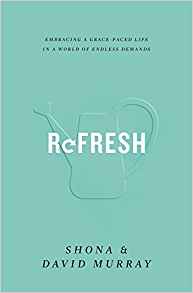
Shona & David Murray
Reviewed by: Meredith Proctor
Refresh: Embracing a Grace-Paced Life in a World of Endless Demands, by Shona and David Murray. Crossway, 2017. Paperback, 208 pages, $8.20 (Amazon). Reviewed by OP member Meredith Proctor.
Do you have a grace-paced life? Are your daily habits sustainable? Or, are you overcommitted, overstretched, and heading for burnout?
Shona Murray, originally from Scotland, is a mother, a doctor, a homeschooler, and the wife of a pastor. She wears many hats, as do most women. In Refresh, Shona (with the help of her husband, David) shares her struggle with depression, a sense of being overwhelmed, and the consequences of suppressing the warning signs in her life. These warning signs included a decrease in her appetite; disinterest in everything around her; taking no comfort in the Scripture, the Word preached, or God’s people; panic attacks; and disinterest in the baby she was carrying. Shona invites us on a very arduous journey of recovery that helped her to finally feel as if she could hear her Master’s voice again and live out his prescription for her life.
“Refresh Gym” is the tool Shona uses to help us experience the joyful refreshment of the gospel of grace. There are ten stations in the Refresh Gym, each of which is a stepping-stone to the next station. Station 1, “Reality Check” is where we begin, and, as the title of the chapter suggests, it calls for a very pointed survey of our lives and the need for change. The second, “Replay,” reorients our focus on God as our Creator and reminds us that we are limited creatures. Echoing Psalm 127:2, “Rest” proclaims that “sleep brings strength and healing” (52). This is a concept that is often overlooked in our society. Station 4, “Re-Create,” drawing from 1 Corinthians 9:10–20 and the fourth commandment, encourages us to find “the wise balance between inactivity and over-activity” (67) and to exercise both body and soul. Five, “Relax” focuses on calming down the clamor of the world by seeking God daily (devotions), by weekly worship (Sabbath), and by annual refreshment (vacations with family). In station 6, “Rethink,” Shona guides us to reorder our priorities. “God defines people first by their spiritual state and then by their spiritual character” (107). “Reduce” provides us with the perspective of not being victims of life’s events. “Christ lived a well planned life but left room for summoned life events” (120). He was always well balanced and the perfect example for us. Station 8, “Refuel,” discusses the role of good food in helping us think and process properly. Here Shona also notes that medication is a “God given provision” when an extra measure of balance is needed (141). In 9, “Relate,” we focus on our relationships with God and with our husband, children, and friends. The final station is “Resurrection” and centers us on a “grace-paced” life, implementing all that has been learned in the previous chapters.
I found this book to be particularly helpful in my current walk of life. For those already struggling with the demands of a fast-paced life, the prescriptions of this book may seem to be a bit overwhelming. But the “stations” are extremely relatable and easy to implement. I highly recommend this book for either personal growth or group study.
January 11, 2026
Texts that Transform: Church and Ministry
January 04, 2026
December 28, 2025
December 21, 2025
December 14, 2025
December 07, 2025
November 30, 2025
© 2026 The Orthodox Presbyterian Church